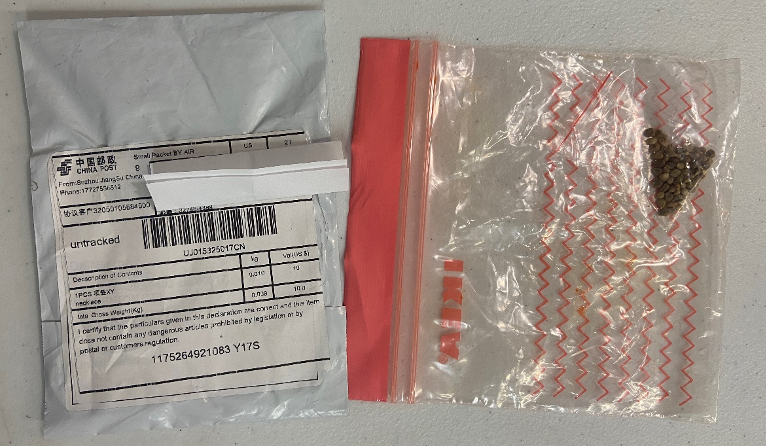
Since July, across the U.S. there have been reports of citizens receiving unsolicited packets of seeds in the mail. The recipients are unsure why they received these seeds or what the seed packets contain. Many of these packages are arriving from China or other countries with foreign postage, symbols or addresses.
The main concern surrounding the seeds is they could introduce invasive species to the U.S. An invasive species is any organism outside of its native habitat that causes damage in the introduced area. Some of the problems that invasive species can cause include economic losses in agriculture or horticulture, disruption of native ecosystems and waterways, competition with native wildlife, and human and animal health hazards. The pathway for introduction describes how an invasive species arrives to a new location. These unknown seed packets could potentially contain an invasive plant species or be harboring an invasive pest or pathogen. In this case, the pathway of introduction is through shipping seed packages internationally.
Officials are concerned about these seeds in Florida since it is a high-risk state for the establishment of invasive species. Florida’s temperate, subtropical, and tropical climates with relatively mild winters allow for year-round survival of many organisms. The state has many international airports and commercial seaports that constantly receive foreign goods serving as pathways for the introduction of non-native plants, animals, and pathogens. Tourism, the number one industry in Florida, also attracts many people to the state acting as additional pathways for the introduction of invasive species.
Due to the potential impacts of invasive species, there are many rules and regulations to aid in preventing their introduction and responding to their detection in the U.S. One of the earliest was the Lacey Act in 1900 that allowed for regulation of the import and interstate transport of illegal wildlife. Several additional acts, including the Plant Quarantine Act, the Federal Plant Pest Act, and the Federal Noxious Weed Act of 1974, followed the Lacey Act to aid in regulating the movement of potentially invasive species. The Plant Protection Act of 2000 is a key regulation that consolidated some of the previous legislation. This act allowed for the USDA-Animal and Plant Health Inspection Services (APHIS) to address issues involving plant protection, quarantine and emergency actions surrounding invasive species.
To collaborate on a national level, Executive Order 13112 created the National Invasive Species Council and the Invasive Species Advisory Committee. From these organizations, the National Invasive Species Management Plan was developed with five strategic goals: prevention, early detection and rapid response, control and management, restoration, and organizational collaboration. In addition to national efforts, there are also state and local efforts that support the strategic goals.
The United States Department of Agriculture (USDA) and the Florida Department of Agriculture and Consumer Services (FDACS) are two organizations that are regularly involved in efforts supporting the five strategic goals, including investigating the reports of suspicious seeds in the mail. From statewide trapping to quarantine and eradication programs to international commodity inspections, these agencies help keep our agriculture and natural resources safe. Some invasive species still slip through these defenses despite all the regulation and resources devoted to invasive species issues. It is important to note that these resources are still limited. In our current globalized world, it is simply not feasible to be able to inspect and regulate all potential pathways of introduction.
In an effort to evaluate potential threats associated with the suspicious seed packets, the USDA and FDACS are gathering the suspicious packages for assessment. As of Aug 12th, there have been no major problems found with the seeds, but only a small amount of the seeds have been tested so far.
If you have received packets of seeds in the mail, do not plant the seeds. You should report these seeds to the authorities for testing and proper disposal. There are several different ways to report the seeds:
-
You can report these seeds online and send them by mail to the USDA-APHIS using this webpage. You can also report the seeds using the USDA-APHIS Anti-Smuggling Hotline at 1-800-877-3835 or SITC.Mail@aphis.usda.gov.
-
You can contact FDACS Division of Plant Industry at 1-888-397-1517 or DPIhelpline@FDACS.gov for instructions.
-
You can also drop off the seed packages at select local UF/IFAS County Extension Offices. Please contact your local extension office for more information.
Above all, invasive species efforts are not a one person job. It takes the strategic development of policies, the collaboration of many organizations, and the cooperation of the public to protect our agriculture and natural resources. You can do your part by reporting any unsolicited seeds you receive by mail.

Morgan Pinkerton is the Sustainable Agriculture and Food Systems Agent with UF/IFAS Extension Seminole County. She is a Doctor of Plant Medicine specializing in invasive species, plant health, and extension education. Prior to her current role, she studied regulatory entomology and focused heavily on policy surrounding the movement of invasive species. She now assists commercial agricultural and horticultural producers in Seminole County in adopting more sustainable practices at their operations. Beyond her work in food systems, she is a competitive beach volleyball player and an avid world traveler.
Disclaimer: The views of the writers do not represent the views of the Florida Food Policy Council. We are a forum for the offering and sharing of information and encourage diversity and communication within the food system.